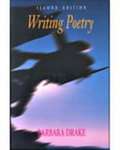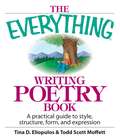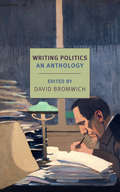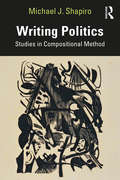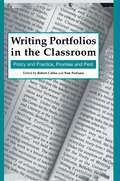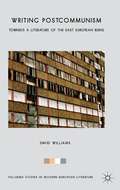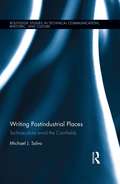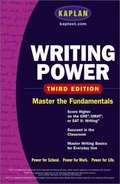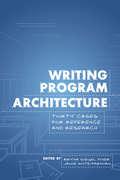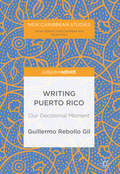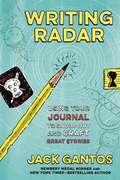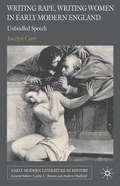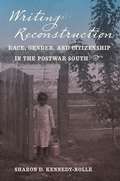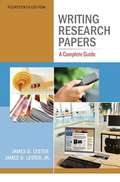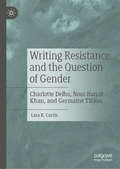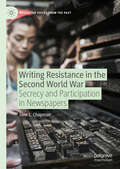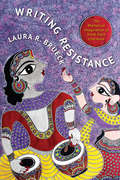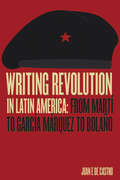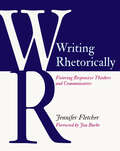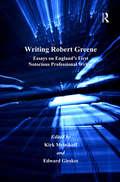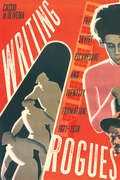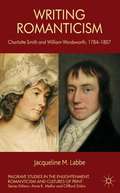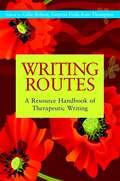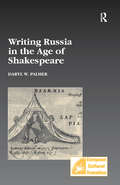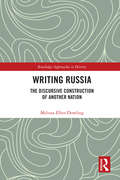- Table View
- List View
Writing Poetry (Second Edition)
by Barbara DrakeThe book intends to be an all-purpose poetry writing textbook, an inspiration and information on the writing process, a solid first step for beginners, and a source of ideas for writers and teachers at all levels.
Writing Poetry Book (The Everything )
by Todd Scott Moffett Tina D EliopulosGiving voice to ''what gets lost in translation'' is the challenge every poet faces. With The Everything Writing Poetry Book, that challenge just got easier. Featuring examples from works of celebrated poets and instruction on communicating your ideas, this clear and accessible reference helps you gain confidence as you find your own voice. Written by a team who each hold a master’s degree and teach creative writing and literature, this easy-to-follow guide has all you need to take your work to the next level. - With this handy guide, you will learn to:Create meter and rhyme - Express your innermost thoughts - Use imagery and metaphor - Polish your word play - Find your own rhythm - Work with other writersand more - The Everything Writing Poetry Book helps you make the most of this rewarding craft - whether you’re a fledgling poet or a seasoned wordsmith.
Writing Politics: An Anthology
by David BromwichExplore the tradition of the political essay with this brilliant anthology.David Bromwich is one of the most well-informed, cogent, and morally uncompromising political writers on the left today. He is also one of our finest intellectual historians and literary critics. In Writing Politics, Bromwich presents twenty-seven essays by different writers from the beginning of the modern political world in the seventeenth century until recent times, essays that grapple with issues that continue to shape history—revolution and war, racism, women&’s rights, the status of the worker, the nature of citizenship, imperialism, violence and nonviolence, among them—and essays that have also been chosen as superlative examples of the power of written English to reshape our thoughts and the world. Jonathan Swift, Edmund Burke, Henry David Thoreau, Harriet Taylor, Abraham Lincoln, George Eliot, W. E. B. Du Bois, Mohandas Gandhi, Virginia Woolf, Martin Luther King, and Hannah Arendt are here, among others, along with a wide-ranging introduction.
Writing Politics: Studies in Compositional Method
by Michael J ShapiroWriting Politics is a methods book designed to instruct on politically focused literary inquiry. Exploring the political sensibilities that arise from the way literary fiction re-textualizes historical periods and events, the book features a series of violence-themed inquiries that emphasize forms of writing as the vehicles for politically attuned historiography. Each investigation treats the way the literary genre, within historiographic metafiction, enables political inquiry. It’s a form of writing that inter-articulates history and fiction to rework a textual past and unsettle dominant understandings of events and situations. Central to the diverse chapters are fictional treatments of authoritarian, fascist, or zealous mentalities. Featured, for example, are Radovan Karadzic (the architect of the Bosnian genocide), Reinhard Heydrich (the architect of the Holocaust’s "final solution"), and the Trotsky assassin Ramon Mercader. Michael J. Shapiro has produced another original and sophisticated bookshelf staple; the only contemporary investigation in Political Studies that instructs on method in this way.
Writing Portfolios in the Classroom: Policy and Practice, Promise and Peril
by Robert C. Calfee Pamela PerfumoThis volume presents chapters by researchers, practitioners, and policymakers who study the impact of classroom portfolios in the assessment of writing achievement by elementary and middle grade students. The focus throughout the volume is on the tension between classroom assessment and externally mandated testing. It presents the efforts of researchers, practitioners, and policymakers to understand the impact of classroom portfolios for the assessment of writing achievement by elementary and middle grade students. Under the auspices of the Center for the Study of Writing, the editors conducted a national survey of exemplary portfolio projects, arranged for a series of "video visits," and held several working conferences. The result of this work is a broad-ranging tale: the aspirations of teachers and administrators to move the machinery of schooling in the direction of more authentic and engaging tasks, the puzzlement of students when they realize that the assignments are real and that the teacher may not have a "right answer" in mind, and the tensions between ivory-tower ideas and everyday classroom practice. Divided into four sections, this research volume: * provides a historical perspective, develops the conceptual framework that serves as a background for many activities described throughout, and discusses numerous practical issues that confront today's researchers and practitioners; * views the phenomenon of writing portfolios through a variety of broadview lenses such as teacher enthusiasm, student reflection, assessment tension, the portfolio as metaphor, and the locus of control; * conveys important conceptual issues with a balance toward pragmatics; and * offers unique insights from the perspective of one individual who serves as scholar, researcher, and teacher.
Writing Postcommunism
by David WilliamsMoving through the elegiac ruins of the Berlin Wall and the Yugoslav disintegration, Writing Postcommunism explores literary evocations of the pervasive disappointment and mourning that have marked the postcommunist twilight.
Writing Postindustrial Places: Technoculture amid the Cornfields (Routledge Studies in Technical Communication, Rhetoric, and Culture)
by Michael J. SalvoExploring the relationship between postindustrial writing and developments in energy production, manufacturing, and agriculture, Michael J. Salvo shows how technological and industrial innovation relies on communicative and organizational suppleness. Through representative case studies, Salvo demonstrates the ways in which technical communicators formulate opportunities that link resources with need. His book is a supple articulation of the opportunities and pitfalls that come with great change.
Writing Power: Score Higher On The Sat, GRE, And Other Standardized Tests
by Kaplan Publishing StaffFeatures: *An intensive writing clinic *Effective tools for organizing ideas *Editing and revising techniques *Concrete examples, including different types of essays and reports *Tips and strategies for developing great topics
Writing Program Architecture: Thirty Cases for Reference and Research
by Jamie White-Farnham and Bryna Siegel FinerWriting Program Architecture offers an unprecedented abundance of information concerning the significant material, logistical, and rhetorical features of writing programs. Presenting the realities of thirty diverse and award-winning programs, contributors to the volume describe reporting lines, funding sources, jurisdictions, curricula, and other critical programmatic matters and provide insight into their program histories, politics, and philosophies. Each chapter opens with a program snapshot that includes summary demographic and historical information and then addresses the profile of the WPA, program conception, population served, funding, assessment, technology, curriculum, and more. The architecture of the book itself makes comparison across programs and contexts easy, not only among the programs described in each chapter but also between the program in any given chapter and the reader’s own program. An online web companion to the book includes access to the primary documents that have been of major importance to the development or sustainability of the program, described in a “Primary Document” section of each chapter. The metaphor of architecture allows us to imagine the constituent parts of a writing program as its foundation, beams, posts, scaffolding—the institutional structures that, alongside its people, anchor a program to the ground and keep it standing. The most extensive resource on program structure available to the field, Writing Program Architecture illuminates structural choices made by leaders of exemplary programs around the United States and provides an authoritative source of standard practice that a WPA might use to articulate programmatic choices to higher administration. Contributors: Susan Naomi Bernstein, Remica Bingham-Risher, Brent Chappelow, Malkiel Choseed, Angela Clark-Oates, Patrick Clauss, Emily W. Cosgrove, Thomas Deans, Bridget Draxler, Leigh Ann Dunning, Greg A. Giberson, Maggie Griffin Taylor, Paula Harrington, Sandra Jamieson, Marshall Kitchens, Michael Knievel, Amy Lannin, Christopher LeCluyse, Sarah Liggett, Deborah Marrott, Mark McBeth, Tim McCormack, John McCormick, Heather McGrew, Heather McKay, Heidi A. McKee, Julianne Newmark, Lori Ostergaard, Joannah Portman-Daley, Jacqueline Preston, James P. Purdy, Ben Rafoth, Dara Regaignon, Nedra Reynolds, Shirley Rose, Bonnie Selting, Stacey Sheriff, Steve Simpson, Patricia Sullivan, Kathleen Tonry, Sanford Tweedie, Meg Van Baalen-Wood, Shevaun Watson, Christy I. Wenger, Lisa Wilkinson, Candace Zepeda
Writing Puerto Rico: Our Decolonial Moment (New Caribbean Studies)
by Guillermo Rebollo GilThis book is a manifesto-like consideration of the potentialities of radical political thought and action in contemporary Puerto Rico. Framed within the context of the present economic crisis, of austerity measures, PROMESA and mass migration, this book engages recent literary, artistic and activist work on the island in order to highlight the manners in which such work—however precarious, innocuous and/or fleeting—fosters hope among audiences, artists, protesters and onlookers alike for a more egalitarian and just society. Autoethnographically grounded, informal in tone, and with an eye toward intersectionality, this book serves as a unique contribution to the field of Puerto Rican Studies, by offering alternate points of departure for emergent theorizing and intellectual production across academic disciplines.
Writing Radar: Using Your Journal to Snoop Out and Craft Great Stories
by Jack GantosThe Newbery Award–winning author of Dead End in Norvelt shares advice for how to be the best brilliant writer in this funny and practical creative writing guide perfect for all kids who dream of seeing their name on the spine of a book.With the signature wit and humor that have garnered him legions of fans, Jack Gantos instructs young writers on using their "writing radar" to unearth story ideas from their everyday lives. Incorporating his own misadventures as a developing writer, Gantos inspires readers to build confidence and establish good writing habits as they create, revise, and perfect their stories. Pop-out text boxes highlight key tips, alongside Gantos's own illustrations, sample stories, and snippets from his childhood journals. More than just a how-to guide, Writing Radar is a celebration of the power of storytelling and an ode to the characters who—many unwittingly—inspired Gantos's own writing career.
Writing Rape, Writing Women in Early Modern England
by Jocelyn CattyThe word 'rape' today denotes sexual appropriation; yet it originally signified the theft of a woman from her father or husband by abduction or elopement. In the early modern period, its meaning is in transition between these two senses, while rapes and attempted rapes proliferate in literature. This age also sees the emergence of the woman writer, despite a sexual ideology which equates women's writing with promiscuity. Classical myths, however, associate women's story-telling with resistance to rape. This comprehensive study of rape and representation considers a wide range of texts drawn from prose fiction, poetry and drama by male and female writers, both canonical and non-canonical. Combining close attention to detail with an overview of the period, it demonstrates how the representation of gender-relations has exploited the subject of rape, and uses its understanding of this phenomenon to illuminate the issues of sexual and discursive autonomy which figure largely in women's texts of the period.
Writing Reconstruction
by Sharon D. Kennedy-NolleAfter the Civil War, the South was divided into five military districts occupied by Union forces. Out of these regions, a remarkable group of writers emerged. Experiencing the long-lasting ramifications of Reconstruction firsthand, many of these writers sought to translate the era's promise into practice. In fiction, newspaper journalism, and other forms of literature, authors including George Washington Cable, Albion Tourgee, Constance Fenimore Woolson, and Octave Thanet imagined a new South in which freedpeople could prosper as citizens with agency. Radically re-envisioning the role of women in the home, workforce, and marketplace, these writers also made gender a vital concern of their work. Still, working from the South, the authors were often subject to the whims of a northern literary market. Their visions of citizenship depended on their readership's deference to conventional claims of duty, labor, reputation, and property ownership. The circumstances surrounding the production and circulation of their writing blunted the full impact of the period's literary imagination and fostered a drift into the stereotypical depictions and other strictures that marked the rise of Jim Crow. Sharon D. Kennedy-Nolle blends literary history with archival research to assess the significance of Reconstruction literature as a genre. Founded on witness and dream, the pathbreaking work of its writers made an enduring, if at times contradictory, contribution to American literature and history.
Writing Research Papers: A Complete Guide (Fourteenth Edition)
by James D. LesterThis market-leading text provides readers with step-by-step guidance through the research writing process, from selecting and narrowing a topic to formatting the finished document. Writing Research Papers backs up its instruction with the most complete array of samples of any writing guide of this nature. The text continues its extremely thorough and accurate coverage of citation styles for a wide variety of disciplines. The fourteenth edition maintains Lester's successful approach while bringing new writing and documentation updates to assist the student researcher in keeping pace with electronic sources.
Writing Resistance and the Question of Gender: Charlotte Delbo, Noor Inayat Khan, and Germaine Tillion
by Lara R. CurtisThis book presents the first comparative study of the works of Charlotte Delbo, Noor Inayat Khan, and Germaine Tillion in relation to their vigorous struggles against Nazi aggression during World War II and the Holocaust. It illuminates ways in which their early lives conditioned both their political engagements during wartime and their extraordinary literary creations empowered by what Lara R. Curtis refers to as modes of ‘writing resistance.’ With skillful recourse to a remarkable variety of genres, they offer compelling autobiographical reflections, vivid chronicles of wartime atrocities, eyewitness accounts of victims, and acute perspectives on the political implications of major events. Their sensitive reflections of gendered subjectivity authenticate the myriad voices and visions they capture. In sum, this book highlights the lives and works of three courageous women who were ceaselessly committed to a noble cause during the Holocaust and World War II.
Writing Resistance in the Second World War: Secrecy and Participation in Newspapers (Neglected Voices from the Past)
by Jane L. ChapmanThis book aims to extend existing historical, literary and media knowledge of neglected written voices as a form of print participation in the Second World War. Uniquely, it is framed by an awareness of contemporary requirements for both secrecy and deception, which, it is argued, were nevertheless characterised by a rare participatory inclusivity in terms of writers and audiences - that has hitherto only been perceived as a characteristic of ‘citizen’s journalism’ in the internet age. Comparative cases of resistance using newspapers during the Second World War comprise original and clandestine sources from France, Belgium, the Netherlands, Norway, and Britain - analysed for the effect that intelligence and planned deception had on local publications as well as on readers of resistance broadsheets.
Writing Resistance: The Rhetorical Imagination of Hindi Dalit Literature (South Asia Across the Disciplines)
by Laura BrueckWriting Resistance is the first close study of the growing body of contemporary Hindi-language Dalit (low caste) literature in India. The Dalit literary movement has had an immense sociopolitical and literary impact on various Indian linguistic regions, yet few scholars have attempted to situate the form within contemporary critical frameworks. Laura R. Brueck's approach goes beyond recognizing and celebrating the subaltern speaking, emphasizing the sociopolitical perspectives and literary strategies of a range of contemporary Dalit writers working in Hindi.Brueck explores several essential questions: what makes Dalit literature Dalit? What makes it good? Why is this genre important, and where does it oppose or intersect with other bodies of Indian literature? She follows the debate among Dalit writers as they establish a specifically Dalit literary critical approach, underscoring the significance of the Dalit literary sphere as a "counterpublic" generating contemporary Dalit social and political identities. Brueck then performs close readings of contemporary Hindi Dalit literary prose narratives, focusing on the aesthetic and stylistic strategies deployed by writers whose class, gender, and geographic backgrounds shape their distinct voices. By reading Dalit literature as literature, this study unravels the complexities of its sociopolitical and identity-based origins.
Writing Revolution in Latin America: From Martí to García Márquez to Bolaño
by Juan E. De CastroIn the politically volatile period from the 1960s through the end of the twentieth century, Latin American authors were in direct dialogue with the violent realities of their time and place. Writing Revolution in Latin America is a chronological study of the way revolution and revolutionary thinking is depicted in the fiction composed from the eye of the storm.From Mexico to Chile, the gradual ideological evolution from a revolutionary to a neoliberal mainstream was a consequence of, on the one hand, the political hardening of the Cuban Revolution beginning in the late 1960s, and, on the other, the repression, dictatorships, and economic crises of the 1970s and beyond. Not only was socialist revolution far from the utopia many believed, but the notion that guerrilla uprisings would lead to an easy socialism proved to be unfounded. Similarly, the repressive Pinochet dictatorship in Chile led to unfathomable tragedy and social mutation.This double-edged phenomenon of revolutionary disillusionment became highly personal for Latin American authors inside and outside Castro's and Pinochet's dominion. Revolution was more than a foreign affair, it was the stuff of everyday life and, therefore, of fiction.Juan De Castro's expansive study begins ahead of the century with José Martí in Cuba and continues through the likes of Mario Vargas Llosa in Peru, Gabriel García Márquez in Colombia, and Roberto Bolaño in Mexico (by way of Chile). The various, often contradictory ways the authors convey this precarious historical moment speaks in equal measure to the social circumstances into which these authors were thrust and to the fundamental differences in the ways they themselves witnessed history.
Writing Rhetorically: Fostering Responsive Thinkers and Communicators
by Jennifer FletcherWriting Rhetorically: Fostering Responsive Thinkers and Communicators, author Jennifer Fletcher aims to cultivate independent learners through rhetorical thinking. She provides teachers with strategies and frameworks for writing instruction that can be applied across multiple subjects and lesson plans. Students learn to discover their own questions, design their own inquiry process, develop their own positions and purposes, make their own choices about content and form, and contribute to conversations that matter to them. Inside this book, Fletcher helps remove some of the scaffolding and explains how to put in practice some methods which can successfully foster: Inquiry, Invention, and Rhetorical Thinking Writing for Transfer Paraphrasing, Summary, Synthesis, and Citation Skills Research Skills and Processes Evidence-Based Reasoning Rhetorical Decision Making' Rhetorical decision making helps students develop the skills, knowledge, and mindsets needed for transfer of learning: the ability to adapt and apply learning in new settings. The more choices students make as writers, the better prepared they are to analyze and respond to diverse rhetorical situations.' Writing Rhetorically' shows teachers what it looks like to dig into real texts with students and novice writers and how it develops them for lifelong learning.
Writing Robert Greene: Essays on England's First Notorious Professional Writer
by Kirk Melnikoff Edward GieskesRobert Greene, contemporary of Shakespeare and Marlowe and member of the group of six known as the "University Wits," is the subject of this essay collection, the first to be dedicated solely to his work. Although in his short lifetime Greene published some three dozen prose works, composed at least five plays, and was one of the period's most recognized-even notorious-literary figures, his place within the canon of Renaissance writers has been marginal at best. Writing Robert Greene offers a reappraisal of Greene's career and of his contribution to Elizabethan culture. Rather than drawing lines between Greene's work for the pamphlet market and for the professional theatres, the essays in the volume imagine his writing on a continuum. Some essays trace the ways in which Greene's poetry and prose navigate differing cultural economies. Others consider how the full spectrum of his writing contributes to an emergent professional discourse about popular print and theatrical culture. The volume includes an annotated bibliography of recent scholarship on Greene and three valuable appendices (presenting apocrypha; edition information; and editions organized by year of publication).
Writing Rogues: The Soviet Picaresque and Identity Formation, 1921–1938
by Cassio de OliveiraPlot elements such as adventure, travel to far-flung regions, the criminal underworld, and embezzlement schemes are not usually associated with Soviet literature, yet an entire body of work produced between the October Revolution and the Stalinist Great Terror was constructed around them.In Writing RoguesCassio de Oliveira sheds light on the picaresque and its marginal characters – rogues and storytellers – who populated the Soviet Union on paper and in real life. The picaresque afforded authors the means to articulate and reflect on the Soviet collective identity, a class-based utopia that rejected imperial power and attempted to deemphasize national allegiances. Combining new readings of canonical works with in-depth analysis of neglected texts, Writing Rogues explores the proliferation of characters left on the sidelines of the communist transition, including gangsters, con men, and petty thieves, many of them portrayed as ethnic minorities. The book engages with scholarship on Soviet subjectivity as well as classical picaresque literature in order to explain how the subversive rogue – such as Ilf and Petrov’s wildly popular cynic and schemer Ostap Bender – in the process of becoming a fully fledged Soviet citizen, came to expose and embody the contradictions of Soviet life itself.Writing Rogues enriches our understanding of how literature was called upon to participate in the construction of Soviet identity. It demonstrates that the Soviet picaresque resonated with individual citizens’ fears and aspirations as it recorded the country’s transformation into the first communist state.
Writing Romanticism
by Jacqueline M. LabbeWhat is 'Wordsworthian' Romanticism and how did it evolve? This book argues that only by reading Charlotte Smith's poetry in tandem with William Wordsworth's can this question be answered, demonstrating their mutual contribution to the creation of the 'Wordsworthian', through literary analysis and historical contextualizing of their writings.
Writing Routes
by Kate Thompson Gillie Bolton Victoria FieldThe use of creative writing as a route to personal or professional development is a powerful therapeutic tool, yet often the most difficult part is knowing how and where to begin. The experiences of others, and the strategies and approaches they have used in their own writing, can provide tried-and-tested models for practice, and 'ways in' that facilitators might wish to recommend to others. Writing Routes is an essential roadmap for anybody setting out on the journey of self-discovery through words. This diverse collection of short pieces introduce and demonstrate many different ways of getting into and thinking about creative writing for personal or professional development. Seventy contributors from a variety of different backgrounds and circumstances explain how they came to write a particular piece and why, how they found ways of transforming their experience into writing, and how it was beneficial to them. Their writing ranges widely, from journal entries and stream of consciousness to autobiography, poetry, fiction and drama, and the pieces are organised by theme and genre for ease of navigation, designed to be 'dipped into' as and when they are needed. This rich and varied collection will provide writing practitioners, counsellors and other related professionals with ideas and techniques to share with their clients, and is a useful resource that individuals who write for their own personal and professional development will return to again and again.
Writing Russia in the Age of Shakespeare (Studies in European Cultural Transition #22)
by Daryl W. PalmerThis study commences with a simple question: how did Russia matter to England in the age of William Shakespeare? In order to answer the question, the author studies stories of Lapland survival, diplomatic envoys, merchant transactions, and plays for the public theaters of London. At the heart of every chapter, Shakespeare and his contemporaries are seen questioning the status of writing in English, what it can and cannot accomplish under the influence of humanism, capitalism, and early modern science. The phrase 'Writing Russia' stands for the way these English writers attempted to advance themselves by conjuring up versions of Russian life. Each man wrote out of a joint-stock arrangement, and each man's relative success and failure tells us much about the way Russia mattered to England.
Writing Russia: The Discursive Construction of AnOther Nation (Routledge Approaches to History #46)
by Melissa-Ellen DowlingWriting Russia offers the first systematic analysis of Anglophone national histories of Russia. By deconstructing preeminent historical works on the history of Russia, this book provides insight into the hidden ideological underpinnings of the texts and their representations of Russia in the West. It demonstrates that historians employ a range of literary techniques to smooth over contradictions in their narratives of Russia, generating a seemingly cohesive depiction of Russia as a liminal, Other nation. This is a process that this book theorises as "discordus", representing an original conceptual framework for examining national history texts. It identifies patterns in the language and emplotment of Anglophone Russian histories across several defining historical epochs from the Mongol conquests to the Putin presidency, revealing the extent to which historians wield the narrative power to "make or break" nations. Postmodern in approach, the work pushes the boundaries of historiography and calls into question the nature of history.
